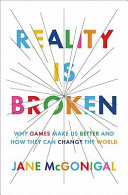Unnecessary Obstacles Make Games
As a golfer, you have a clear goal: to get a ball in a series of very small holes, with fewer tries than anyone else. If you weren’t playing a game, you’d achieve this goal the most efficient way possible: you’d walk right up to each hole and drop the ball in with your hand. What makes golf a game is that you willingly agree to stand really far away from each hole and swing at the ball with a club. Golf is engaging exactly because you, along with all the other players, have agreed to make the work more challenging than it has any reasonable right to be.
Add to that challenge a reliable feedback system—you have both the objective measurement of whether or not the ball makes it into the hole, plus the tally of how many strokes you’ve made—and you have a system that not only allows you to know when and if you’ve achieved the goal, but also holds out the hope of potentially achieving the goal in increasingly satisfying ways: in fewer strokes, or against more players.
Golf is, in fact, Bernard Suits’ favorite, quintessential example of a game— it really is an elegant explanation of exactly how and why we get so thoroughly engaged when we play. But what about a game where the unnecessary obstacles are more subtle?
In Scrabble, your goal is to spell out long and interesting words with lettered tiles. You have a lot of freedom: you can spell any word found in the dictionary. In normal life, we have a name for this kind of activity: it’s called typing. Scrabble turns typing into a game by restricting your freedom in several important ways. To start, you have only seven letters to work with at a time. You don’t get to choose which keys, or letters, you can use. You also have to base your words on the words that other players have already created. And there’s a finite number of times each letter can be used. Without these arbitrary limitations, I think we can all agree that spelling words with lettered tiles wouldn’t be much of a game. Freedom to work in the most logical and efficient way possible is the very opposite of gameplay. But add a set of obstacles and a feedback system—in this case, points—that shows you exactly how well you’re spelling long and complicated words in the face of these obstacles? You get a system of completely unnecessary work that has enthralled more than 150 million people in 121 countries over the past seventy years.
Notes:
Folksonomies: gamification
Taxonomies:
/sports/golf (0.733566)
/health and fitness/disease/heart disease (0.471413)
/health and fitness/disorders/mental disorder/a.d.d. (0.447654)
Keywords:
unnecessary obstacles (0.977522 (negative:-0.613326)), increasingly satisfying ways (0.787007 (neutral:0.000000)), reliable feedback system—you (0.780981 (positive:0.799529)), completely unnecessary work (0.775941 (negative:-0.812753)), game (0.591823 (negative:-0.136519)), fewer tries (0.588422 (negative:-0.546420)), fewer strokes (0.565357 (negative:-0.475426)), small holes (0.560113 (negative:-0.430117)), goal (0.541494 (positive:0.398477)), clear goal (0.538990 (neutral:0.000000)), reasonable right (0.537189 (positive:0.699241)), efficient way (0.536060 (positive:0.531462)), elegant explanation (0.535436 (positive:0.901558)), words (0.529421 (negative:-0.394219)), quintessential example (0.524959 (positive:0.679764)), Bernard Suits (0.515931 (positive:0.242768)), typing. Scrabble (0.512736 (negative:-0.316057)), normal life (0.508440 (neutral:0.000000)), important ways (0.505601 (positive:0.609317)), finite number (0.497218 (neutral:0.000000)), feedback system—in (0.490980 (positive:0.453898)), interesting words (0.489807 (positive:0.258242)), ball (0.488773 (negative:-0.400892)), golf (0.416365 (positive:0.519438)), players (0.405474 (negative:-0.402857)), freedom (0.396145 (positive:0.387711)), letters (0.325558 (negative:-0.207251)), tally (0.276542 (neutral:0.000000)), golfer (0.275352 (negative:-0.466591)), hand (0.269537 (negative:-0.473859))
Entities:
Golf:Sport (0.932410 (positive:0.519438)), Bernard Suits:Person (0.512504 (positive:0.242768)), seventy years:Quantity (0.512504 (neutral:0.000000))
Concepts:
Game (0.932969): dbpedia | freebase | opencyc
Spelling (0.862899): dbpedia | freebase | opencyc
Golf (0.830575): dbpedia | freebase | opencyc
Play (0.786411): dbpedia | freebase | opencyc
The Work (0.584891): dbpedia | freebase | yago
Ball game (0.573505): dbpedia | freebase
Orthography (0.561943): dbpedia | freebase
By the Way (0.548076): dbpedia | freebase | yago





